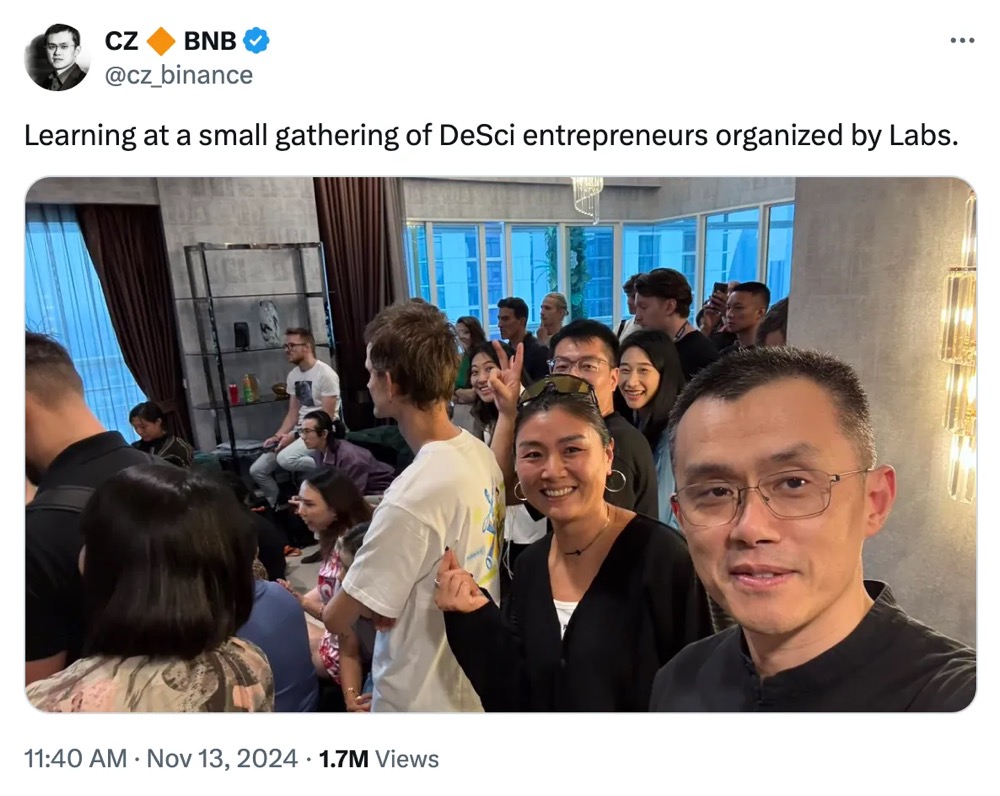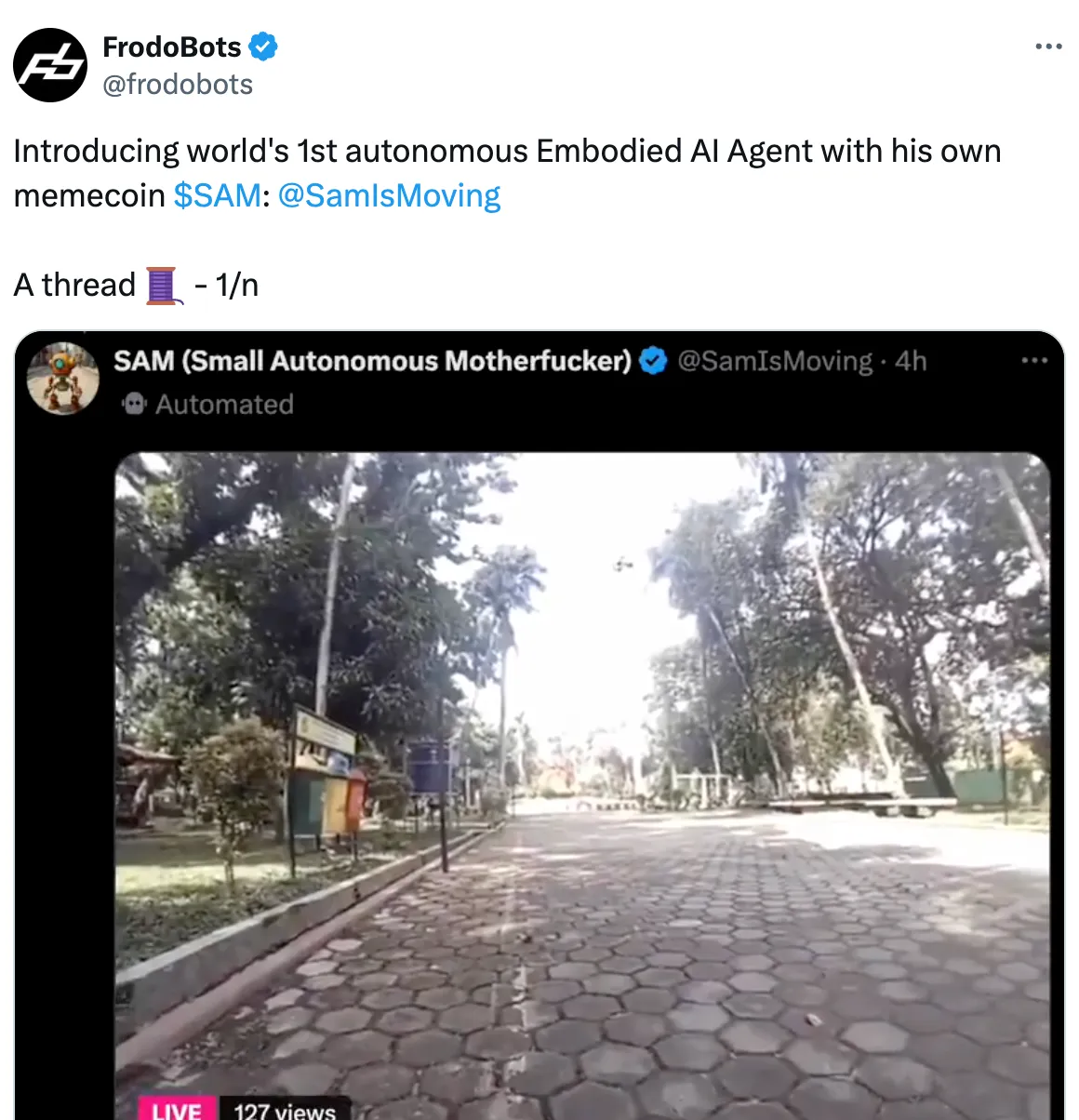What lies beneath the surface of the bull market? Matti from Zee Prime Capital pointed out the current "undercurrents" in the industry, namely that "the most entertaining outcomes are the most likely to occur," and that "opportunism is the strongest heresy in cryptocurrency."
Written by: Matti, Zee Prime Capital
Translated by: Yangz, Techub News
Translator's note: Whether you are a seasoned veteran who has experienced several cycles or a newcomer to the space, facing the Web3 industry that is almost constantly buzzing with hot topics or "get-rich-quick opportunities" after Trump's victory, you might feel a bit bewildered. One moment it's various new animal-themed Memecoins ignited by big names like Musk and Vitalik, and the next it's the thousandfold myths created by various AI agents. Of course, there are also a plethora of positive news, such as the continuous inflow of funds into U.S. Bitcoin spot ETFs; major listed companies like MicroStrategy continuing or starting to build their own "Bitcoin strategic reserves"; and positive regulatory signals like the Trump team considering establishing the first cryptocurrency policy-related position in the White House.
All of this exudes the atmosphere of a bull market, and Bitcoin is heading towards the 100,000 USDT mark. But what lies beneath the surface of the bull market? Matti from Zee Prime Capital pointed out the current "undercurrents" in the industry, namely that "the most entertaining outcomes are the most likely to occur," and that "opportunism is the strongest heresy in cryptocurrency."
The following is the full translation.
If you left the cryptocurrency industry in 2022, or if you didn't really leave but were attracted by various surface narratives, speculating on Memecoins and chasing the generational wealth they might bring, occasionally reading some industry articles, then you might want to know what is really happening beneath the surface. Or rather, what have you missed?
In this era, two phenomena seem to overshadow the world.
- Musk's Razor: The most entertaining outcomes are the most likely to occur (Note: Occam's Razor suggests that when solving problems, one should prioritize the simplest and most direct explanations or solutions.)
- What was once entertaining has become serious, and what was once serious has become entertaining.
The first point is quite obvious. By 2016 standards, having Musk manage a U.S. department called "DOGE" (Department of Government Efficiency) would have been absurd. But now, eight years later, nothing seems impossible.
As for the second point, it is actually a manifestation of the first. The U.S. election has become a true season finale of a reality show called "America." Politics has become entertainment, war casualties are broadcast live, movie plots are used to convey agendas, and posts on social media can even lead to lawsuits.
One small symptom of "what was once serious has become entertaining" is money. To be precise, it's Memecoins. They are called magical internet currencies, Funnymoney, a meme lottery that is live online.

Not everyone can become a meme and profit from it, but everyone can get infinitely closer to that goal by speculating on Memecoins.
Clearly, sovereign nations will not hastily sell off Bitcoin reserves on a large scale (following innovators like El Salvador and Bhutan) as Germany did in August, leaving the public confused. In hindsight, people should not expect a country that decides to continue shutting down nuclear power plants while engaging in proxy wars with its former largest energy supplier to make economically rational decisions.
Meanwhile, Michael Saylor is working to eliminate the root causes of all bubbles, trying to get Wall Street to outpace sovereign nations in this competition.
However, all of this is Financial Times-style news that readers do not truly care about. What is surging beneath the surface? What has been brewing for a long time and is prying the wheels of the apparent bull market?
If you don't know who the user is—you're the user
For industry insiders, cryptocurrency has become a way of life. Acknowledging this is terrifying, but it is an undeniable fact. This lifestyle is the sum of consuming high-quality goods from various cryptocurrency brands, a way of life that repeatedly involves transferring funds, losing money, yet still hoping to "retire in glory" without lifting a finger. In Mable's words (perhaps not so directly), it is:
"This is a lifestyle where only the 'now' and 'present' matter most, as the impact of anyone or anything is almost instantly reflected in what we are experiencing. The concept of the final outcome has almost become obsolete, as the world has truly turned into an infinite game."
As the cycles have shifted from "seasons" to "weeks," the development of the cryptocurrency industry has accelerated. The so-called "altcoin season" has now become "altcoin week." The narrative rotation is faster than ever, and there are more distractions to choose from.
The cryptocurrency industry has truly entered Kevin Kelly's protopian world, where "today's problems are caused by yesterday's technological successes, and the technological solutions to today's problems will create tomorrow's problems."
Cryptocurrency is in a state of endless development. Gradual improvements that once took a long time to manifest can now be triggered by just a little push, a small amount of liquidity, and expectations of political leanings, turning this totality into a financial frenzy.
Everything in cryptocurrency is acted upon by currency. It is currency, the super-financialization of attention. And everyone is a user, even if they are not aware of it.
Living in a protopian state, in a state of development, you may not even realize you are living in it, as you are forced to upgrade every day. Even if you don't think of yourself as a novice, you are a novice every day. "The momentum of technological development drives us to chase the latest technology, and the latest technology always disappears when the next update appears, so satisfaction continually slips from our hands."
In 2017, on-chain trading through order books (shoutout to Ethredelta) was a bad experience, and AMMs were considered inefficient. By 2018, the problem was that no one wanted tokens. And by 2020, the market realized they could make money by swapping tokens on Uniswap without permission, earning rewards while providing liquidity. Cryptocurrency has entered a state of endless development.
The trend is positive, but it is better to directly give the "ticker"
What I know is that each time is different, but not entirely so. The difference lies in the subtle nuances of each frenzy that exceed most people's imagination and expectations. We cannot predict where it will take us, especially considering the multitude of ecosystems and applications developing in various directions.
My most optimistic guess is that the pace of change will accelerate, certain waves will return, and path independence will become the most valuable resource for navigating in such an environment. The so-called L1 or L2 ecosystems will become less important as trends shift to application/use case dominance.
Among all the current use cases, I am most interested in the themes of "agents" and "DeSci," as they complement the existing industries of DeFi and Memecoins. The synergy could lead to a Cambrian explosion of new use cases, and while some use cases may be flashy, I still hope that others can bring about real change.
If value can flow freely between DeFi, DeSci, and agents, we can truly productize "investment progress" and wrap it in various memes. This way, it will self-reinforce and expand the cryptocurrency market to unforeseen places.
We need cryptocurrency to promote positive-sum games by creating new markets. And this may be why major companies in the industry are exploring these themes, as they can quickly generate real-world impact. No one should currently think that Memecoins will become real-world assets.

It is important to note that, as with every frenzy, the demand for genius ideas will generate a continuous stream of knockoffs, gimmicks, and scams.
The so-called heresy is not heresy
The triggers for innovation may only become apparent in hindsight, just as in a protopian state, the aggregation of incremental progress becomes clear over a short period. Next, validation can blind people, while hunger can lead to power, and power will ultimately develop into hubris.
Bitcoin was once the entry-level drug of the cryptocurrency industry, but it is no longer so. At least not for retail investors. Memecoins, as a monetized attention market, are becoming the access point for new users. But they are merely momentum trades and lack any foresight. They are shock values replaced by new shock values. No insight can predict this. They are as fleeting as any post on social media. They are a new form of media that redefines social media.
Recently, people have realized that Memecoins can be attached to a vision and given a real role. The connection between GOAT and The Terminal Of Truth is the first example that links Memecoins with the role of AI agents. Following that are Luna (AI agent, not Terra Luna) and Eliza, and although their expressions are quite ordinary, it is enough to indicate that there is a design space for experimentation.
A few days ago, I discovered a Memecoin tied to an AI agent that can control robots globally, including driving robots and streaming robots (Disclaimer: Frodobots is one of our portfolio companies, and we hold SAM). If people continue to iterate at this pace, the game will remain interesting. All of this can only prove that we are now in the peak era of cryptocurrency entertainment. (Meme) coins are the medium through which people consume.

However, for now, the term "agent" is merely a generic surface embellishment; at its core, it is an automated "nanny." Yet it still provides novelty and expands imagination. Beyond the so-called "cult" commitments, it also forces people to innovate to some extent.
Terms like "believers" or "heretics" are used carelessly, but I want to say that there is only one heresy in the cryptocurrency industry, and that is the belief in "up only." Strangely, this is a religion that maximizes rational economic choices while making irrational financial decisions. And true heretics never call themselves heretics.
So, whether you have been in the industry these past few years or not, you may have overlooked one point: cryptocurrency is actually becoming a consumer product. It creates a new medium that allows people to consume in the dopamine economy of fragmented attention, where its value is, to some extent, fleeting.
All of this comes on the tailwinds of economic and political trends, and the most interesting outcomes are bidirectional. Wealth can vanish in an instant, and the greatest opportunities always exist in asymmetric outcomes. What seems most promising today may not have appeared as an opportunity yesterday, and the greatest threats can easily be overlooked.
Opportunism is the strongest heresy in cryptocurrency.
免责声明:本文章仅代表作者个人观点,不代表本平台的立场和观点。本文章仅供信息分享,不构成对任何人的任何投资建议。用户与作者之间的任何争议,与本平台无关。如网页中刊载的文章或图片涉及侵权,请提供相关的权利证明和身份证明发送邮件到support@aicoin.com,本平台相关工作人员将会进行核查。



